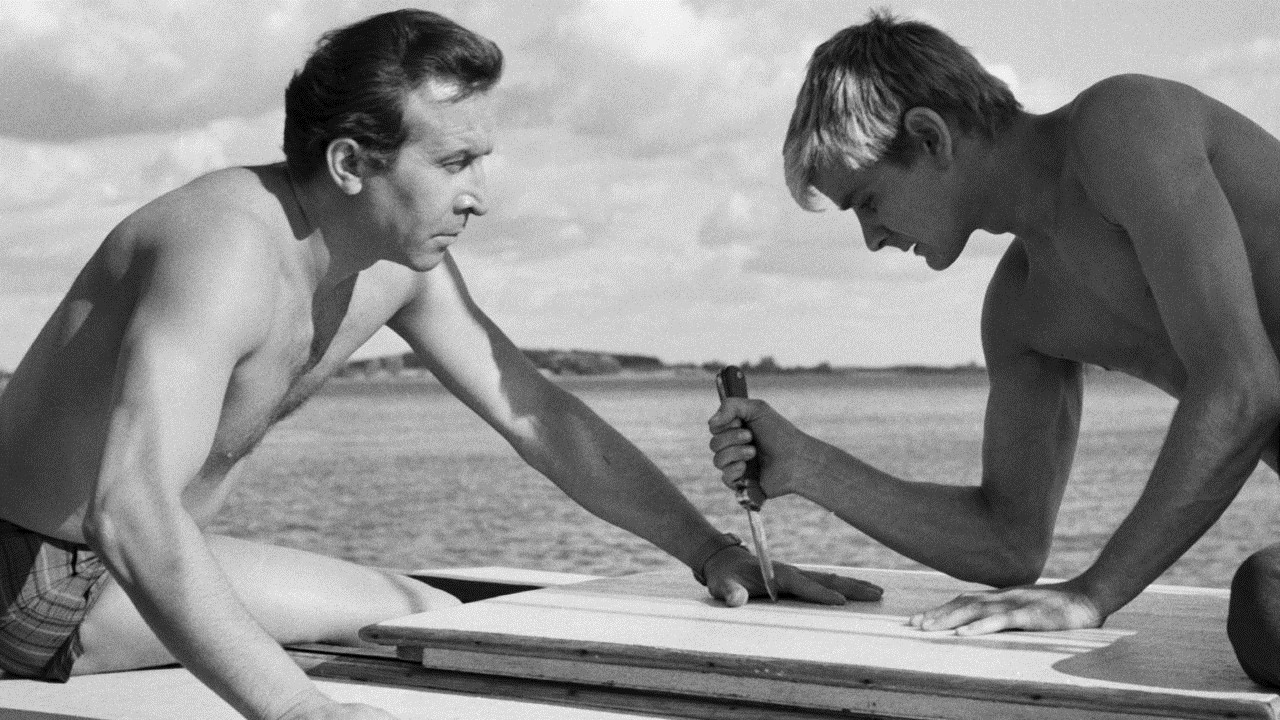Summary:
A couple picks up a hitchhiker on their way to a sailing trip and decides to bring him along.
My Thoughts:
This year, one of my goals for TMM was to watch and review all of Polanski’s films, and so far I’ve been incredibly impressed. “Knife in the Water” is Polanski’s debut film, and while it hints at some of the more talky thrillers to come from Polanski later (“Death and the Maiden”, “Venus in Fur”), I really found myself drawing comparisons to early Bergman films (“Summer with Monika”, “Sawdust and Tinsel”). This film really leans heavily in to Polanski’s artistic side, while some of his other films like “The Pianist” and “Chinatown” are more mainstream. This film is slower, and the scope is much smaller, but that doesn’t make it any less impressive. With his debut film, Polanski shows that he knows the language of cinema and he knows how to bring great subtext to even the most mundane of moments.
“You’re just like him only half his age and twice as dumb.”
A married couple, Andrzej (Leon Niemczyk, “Inland Empire”) and Krystyna (Jolanta Umecka) drive through the country and pick up a hitchhiker (Zygmunt Malanowicz, “The Lure”) on their way to their boat. When they arrive, they offer to take the hitchhiker on a sailing expedition and soon the two men find themselves competing for Krystyna’s attention.
I honestly didn’t know too much about this film going into it, but I had opposing reviews from two friends whom had both seen this film; one of them loved it, and one of them thought it was boring. I can absolutely see how both of them came to their conclusions about film; compared to some of Polanski’s other thrillers (“Chinatown”, “Frantic”), this film is pretty slow. But for people who are used to watching 60s art films, the pace of this film is pretty much par for the course. There isn’t a lot that happens in this film in terms of story; it’s all about the subtext that runs beneath each scene. This film essentially becomes “Toxic Masculinity: The Movie”.
As I mentioned above, I found myself drawing comparisons between this film and some of Bergman’s early work, before he really started to wade into the surreal. Every conversation in this film has weight and a kind of double meaning; it’s as if each conversation is a move in a game, and the game’s players are the three people aboard. As our film starts, our characters all seem to struggle to work out a relationship that works for all three characters. The unnamed hitchhiker wants, for whatever reason, to be accepted by this couple, and Andrzej seems to accept him out of sheer patronization.
As the trip begins, Andrzej seems content to badger the hitchhiker and give him guff for standing in the middle of the road. The hitchhiker seems unconcerned with Andrzej’s advice however and instead tries to show off by bragging about who he is and what he’s done, when, really, he has nothing to brag about. When they arrive at the docks, the two men playfully banter back and forth as Andrzej prepares the boat for a sailing trip, and soon he invites the boy along; again, it seems he does this only to show off. Andrzej knows how to sail; he’s in his element here, and the hitchhiker claims he doesn’t even know how to swim (he’s out of his depth). As the boat trip commences, the hitchhiker talks about how certain things Andrzej is doing don’t look that hard, but when he attempts them himself he bumbles and fails. As the trip continues, the tensions between the two men flit back and forth from playful to serious, eventually culminating in an accident.
This film comments on what it means to grow into a man, about the expectations of those around you and above you, and about what we do to impress those around us for sometimes rather trivial reasons. The Hitchhiker becomes a stand in for all young men looking up to their idols or those that have everything they want, hoping one day to be like them. When the film starts, Andrzej seems an ideal man for the hitchhiker to model himself after- he’s rather wealthy, he has a loving wife, and he is intelligent and sure of himself in a crisis. But as the film goes on, Andrzej’s perfect mask begins to crumble, and the imperfections of his personality begin to surface- he might be a smart man, but he can be callous and even cruel at times. The hitchhiker’s naivety almost becomes a positive quality when compared to the way Andrzej behaves towards the end of the film.
Verdict:
The way this film ends sort of leaves the viewer with questions of where do we go from here, what have we learned, and what was the meaning of it all? I’m incredibly impressed by this film, mostly because this was Polanski’s debut, and it feels like the work of a seasoned veteran. While this might not be as exciting as some of Polanski’s other films, it does have just as much to say.
Review Written By:






